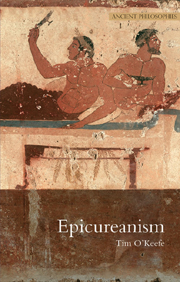Book contents
- Frontmatter
- Contents
- Preface
- Acknowledgements
- Sources and abbreviations
- Chronology
- 1 Introduction: the life of Epicurus and the history of Epicureanism
- I Metaphysics and physics: introduction and overview
- II Epistemology: introduction and overview
- III Ethics: introduction and overview
- 11 Pleasure, the highest good
- 12 Varieties of pleasure, varieties of desire
- 13 The virtues and philosophy
- 14 Justice
- 15 Friendship
- 16 The gods
- 17 Death
- Glossary of terms
- Notes
- Further reading
- Bibliography
- Index
17 - Death
from III - Ethics: introduction and overview
- Frontmatter
- Contents
- Preface
- Acknowledgements
- Sources and abbreviations
- Chronology
- 1 Introduction: the life of Epicurus and the history of Epicureanism
- I Metaphysics and physics: introduction and overview
- II Epistemology: introduction and overview
- III Ethics: introduction and overview
- 11 Pleasure, the highest good
- 12 Varieties of pleasure, varieties of desire
- 13 The virtues and philosophy
- 14 Justice
- 15 Friendship
- 16 The gods
- 17 Death
- Glossary of terms
- Notes
- Further reading
- Bibliography
- Index
Summary
Even more than fear of the gods, the fear of death troubles us. The Epicureans offer two main arguments against the fear of death: the “no subject of harm” argument and the “symmetry” argument. Both try to show that your death is not bad for you, and hence it should not be feared. But the Epicureans also address whether you should worry about your death being bad for others, or the death of others bad for you. Finally, they realize that the fear of death is often fuelled by subconscious factors, and completely curing the fear of death requires that these too be eradicated.
The “no subject of harm” argument
The main Epicurean argument against the fear of death is the “no subject of harm” argument. In it, the Epicureans argue that for death to be bad, it must be bad for somebody: the harm of death must have a subject. But death is annihilation: after you die, you do not exist. So your death cannot be bad for you. As Epicurus says, death is “nothing to us”. When we exist, death is not present, and when death is present, we do not exist. So it is nothing, to either the living or the dead. It does not affect the living, as they are not yet dead: they have not been annihilated.
- Type
- Chapter
- Information
- Epicureanism , pp. 163 - 174Publisher: Acumen PublishingPrint publication year: 2009



